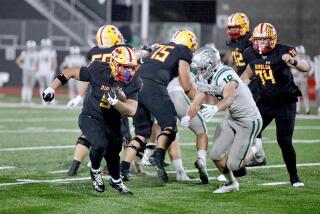Blue Book’s Language Is Vague on Purpose, but That May Change
- Share via
The California Interscholastic Federation-Southern Section Blue Book is a 125-page document that dictates the proper conduct of 479 high school athletic programs in Southern California.
Rule 510, which deals with undue influence in recruiting a prospective student, is part of that book, and it’s the rule that Mater Dei High School was found in violation of Wednesday. The Southern Section Executive Committee’s decision required 10 hours of hearings and three hours of deliberation, which is attributable to the fact that Rule 510, like many other rules contained in the Blue Book, is worded vaguely. This is not without a purpose.
Stan Thomas, Southern Section commissioner, in December said: “It’s the only thing we have to protect us in a court of law. The book’s language is purposely vague to protect this organization.”
But that approach came under fire during and after Wednesday’s hearing. Raymond Alvarado, attorney for Mater Dei basketball’s coach, Gary McKnight, said after the Southern Section Executive Committee made its recommendations: “The way the rules are so vaguely written, the CIF can stick it to any school it wants.”
Thomas said Thursday that the Mater Dei case may bring about changes in some wording of the Blue Book.
“I can tell you the Blue Book committee will be meeting in the near future, and I’m going to recommend the review of Rule 510,” he said. “I think their (Mater Dei’s) lawyers were right; it is too vague. To tell you the truth, I’m going to recommend the rule be rewritten. . . . We’ve got to be more definite.”
Dennis Evans, the Corona del Mar principal who brought the charges against Mater Dei, said during the hearings that he understood the spirit of Rule 510. But he said Thursday: “I have a legitimate concern about some of the ambiguity of the rule. I think the rule needs to be strengthened, and it also needs to be more explicit.”
Typical of the rule’s ambiguity is a question-and-answer format that follows it. Question and answer spots appear throughout the book and are intended to clarify various rules. One of the six questions after Rule 510 deals with the crucial issue of coaches’ contact with parents of prospective students.
The answer says that a coach must refer all contact to a school administrator. It goes on to say that all contact with the parents should be “handled” by the administrator.
Mater Dei argued that John Merino, Mater Dei assistant principal, “handled” the contact by personally taking the parents over to meet McKnight and Chuck Gallo, the football coach, and staying with them as they spoke.
The Executive Committee ruled that by simply allowing the parents to talk to the coaches, Mater Dei had broken the spirit of the rule, and recommended that Merino be removed from any duties connected with athletics.
Clancy Haynes, attorney for Gallo, argued “that if the rule means no contact, it should simply read that in the answer. None.”
In the future, it may.
Rule 510
The use of undue influence by any person or persons to secure or retain a student or to secure one or both parents or guardians of a student as residents may cause the student to be ineligible for high school athletics for a period of one year and shall jeopardize the standing of the high school in the California Interscholastic Federation.
- 510.1: This rule applies equally to any actions by any person or persons to enroll a student who is a graduate of the eighth or ninth grade of a junior high school in any member high school other than the public high school in the attendance area in which the student’s parents or legal guardians reside.
- 510.2: The object of the recruiting rule is to assure that the student athlete is making a free and unpressured choice of his or her high school. It would therefore even preclude any effort on the part of a friend or representative of the public high school in the attendance area in which the student’s parents reside, from attempting to secure the student’s enrollment at that school. The rule does not prohibit a student’s voluntary participation in a summer sports activity.
More to Read
Get our high school sports newsletter
Prep Rally is devoted to the SoCal high school sports experience, bringing you scores, stories and a behind-the-scenes look at what makes prep sports so popular.
You may occasionally receive promotional content from the Los Angeles Times.






